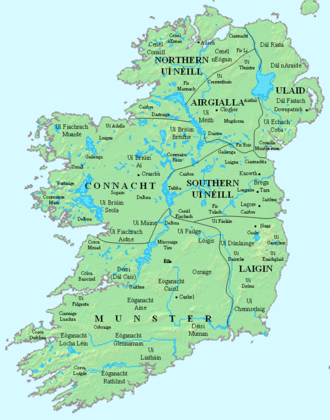
13 September 908 AD: The Battle of Belach Mugna/Cath Belach Mugna was fought on this day. (Bellaghmoon, in the south of modern County Kildare). In this engagement the Bishop-King of Cashel, King Cormac mac Cuilennáin, was thoroughly defeated while trying to extract tribute from the King of Leinster [Laigan]. He invaded the Leinster territory expecting an easy victory but the King of Tara, one Flann Sinna of the southern O’Neills, was not prepared to see the land of Leinster under anyone’s thumb but his own. In alliance with the King of Connacht he led a relief expedition into Leinster and in a great battle the combined forces of Connacht, Leinster and the O’Neills of Meath routed the forces of King Cormac who was unhorsed and beheaded.
The Munster men entered the battle at a distinct numerical disadvantage of which they were acutely aware of. Information had reached their camp in the woods that King Flann Sinna of Tara had brought his army south to reinforce King Cerball, King of Leinster . This was in order to ward off the threat to this kingdom. In addition King Cathal of Connacht came from the west with his host to support Flann Sinna, who he acknowledged as his High King. It looks like the Munstermen came out of their wooded enclosure and formed up for battle with the Wood at their backs. This may well have been a deliberate tactical decision as that way they could not be taken in the rear and such a disposition would make it difficult for their flanks to be turned.
Then the men of Munster sounded trumpets and battle cries, and proceeded to Mag Ailbe [Co Carlow]. They were waiting for their enemies with their backs to a dense wood. The men of Munster formed themselves into three equally large, equally extensive battalions: Flaithbertach son of Inmainén and Cellach son of Cerball, king of Osraige, leading the first battalion; Cormac son of Cuilennán, the king of Munster, leading the middle Munster battalion; Cormac son of Mothla, king of the Déissi, and the king of Ciarraige, and kings of many other tribes of West Munster in the third battalion.
Fragmentary Annals of Ireland
In the event the battle quickly became a rout. When the battle was joined, many important Munstermen began to desert. Cormac himself attempted to flee but fell from his horse and broke his neck. King Cellach mac Cerbaill of the Osraige [Kilkenny] too was amongst the slain along with a large number of prominent nobles.
In the aftermath of the battle his Cormac's head was offered to King Flann as a trophy but the King of Tara refused to dishonour his noble opponent. He took the head and kissed it and had it brought in all solemnity to be reunited with its torso. Cormac’s mortal remains were then given to Bishop Móenach who had the body interred at the Monastery of Dísert Diarmata [Castle Dermot, Co Kildare]. Móenach had tried to mediate between the warring sides prior to the battle but without success.
This was one of the most important battles in Ireland for a long time as Cormac’s death severely weakened the grip of the Eoghanachta - the extended royal family that had ruled Munster for centuries. Their power had been slipping and now the weakness of their line was out in the open. Within a few more decades their power was no more and Munster had new rulers with bigger agendas.
A battle was fought between the men of Mumu, the Leth Cuinn, and the Laigin in Mag Ailbi on the feast of Dagán of Inber Dáile, i.e. on Tuesday the Ides 13th of September, the thirteenth of the moon, and Cormac son of Cuilennán, king of Caisel, was killed there together with other distinguished kings. These are: Fogartach son of Suibne, king of Ciarraige, Cellach son of Cerball, king of Osraige, Ailill son of Eógan, superior of the Trian of Corcach, and Colmán, superior of Cenn Eitig. Flann son of Mael Sechnaill, king of Temair, Cerball son of Muirecán, king of Laigin, and Cathal son of Conchobor, king of Connacht, were victors.
Annals of Ulster
No comments:
Post a Comment